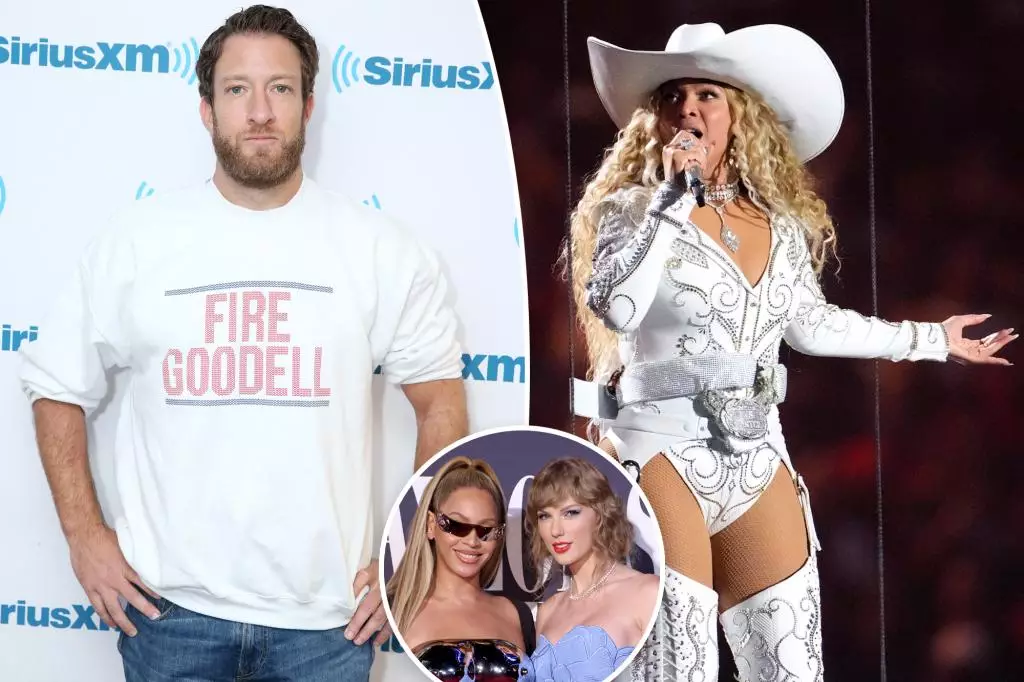In the ever-polarizing world of pop music fandom, the rivalry between stars can often bleed into the opinions of their fans, creating a vibrant but contentious culture. Recently, Dave Portnoy, founder of Barstool Sports and a notorious figure in the social media landscape, stirred controversy by expressing his unfavorable view of Beyoncé during her highly anticipated halftime show at the Baltimore Ravens versus Houston Texans game. This incident not only highlights Portnoy’s entrenched allegiance to fellow pop icon Taylor Swift but also opens a conversation about fandom, celebrity rivalries, and public discourse in the age of social media.
Portnoy’s disdain was palpable as he took to social media to voice his unimpressed reaction to Beyoncé’s performance, proclaiming that she has “been LOST since Destiny’s Child.” His harsh criticism followed Beyoncé’s elaborate entrance at the NRG Stadium, where she dazzled fans with a crystal-embellished, white bodysuit and a series of notable performances from her country-themed album, “Cowboy Carter.” The spectacle was enhanced by the inclusion of A-list talent, highlighting her status as a performer who consistently raises the bar. Nonetheless, Portnoy’s blunt dismissal underscored an apparent schism in pop music opinion—a reflection of his staunch loyalty to Swift, suggesting a competitive edge in fandom that many have witnessed before.
The 13-minute performance featured multiple hits and collaborations, showcasing Beyoncé’s undeniable prowess as a performer; however, Portnoy seemed unmoved. His simultaneous promotion of Taylor Swift hints at a deeper narrative at play—the competition between artists that spills over into their fanbases, fueling divisions among listeners.
Times where fandom emerged as a battleground are not new, and the music industry has often reflected these rivalries. Observers might speculate whether Portnoy’s critical stance towards Beyoncé stems from his unwavering support of Taylor Swift. Even amidst the applause from fans and performers alike for Beyoncé’s halftime show, Portnoy’s social media reactions have consistently sided with Swift, indicating his preferences draw a line between two heavyweights of the music scene.
Interestingly, despite the rivalry perceived widely in the media, reports surfaced that Swift herself holds no ill will toward Beyoncé. In stark contrast to Portnoy’s stance, an insider noted that Swift has always supported her fellow female artists, viewing the success of someone like Beyoncé as deserving recognition. This juxtaposition raises questions about whether fans can navigate their dialogues on artists without letting personal biases distort their appreciation for the craft.
The resurgence of debates surrounding Beyoncé and Swift echoes the 2009 MTV Video Music Awards incident, where Kanye West infamously interrupted Swift’s acceptance speech, igniting another chapter in the ongoing narrative of celebrity rivalries. Both celebrities have enjoyed monumental careers, yet it is the commentary surrounding their perceived competition that continues to capture public attention.
Portnoy’s statements contribute to a culture where media personalities wield considerable influence. His comments help embolden an existing divide among fans and artists, intensifying conversations that may detract from the individual artistry that both Beyoncé and Swift represent. In an age where social media reigns supreme, the responsibility lies with fans and public figures alike to reflect on how their opinions shape perceptions of art and artists.
The recent fray incited by Portnoy’s words is emblematic of a larger societal tendency to pit artists against each other, overshadowing their unique contributions to the music industry. As swift as Portnoy’s criticism may be, it ultimately reveals the need for a shift in conversation—a shift that embraces the diversity of artistic expression rather than reducing it to one-dimensional rivalries. In a world rich with creative talent, let us celebrate the artistic journeys of all individuals, granting them the acknowledgement they rightly deserve while engaging in discourse that fosters understanding and unity rather than division.

